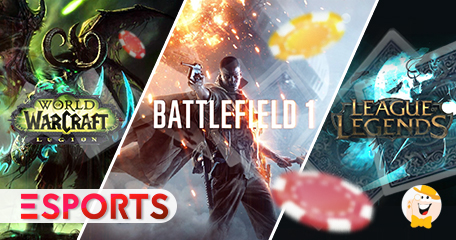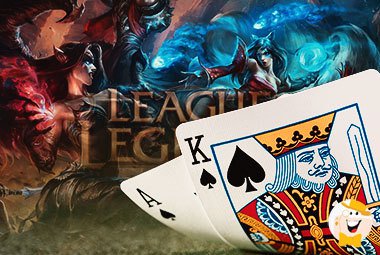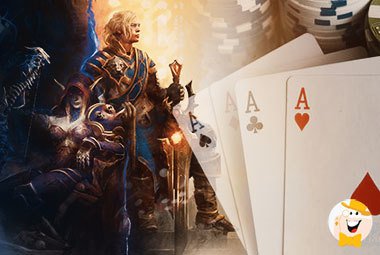
All battlegrounds are pretty much the same. It’s a struggle to prevail facing threatening challenges and often unfavorable odds as we balance the risks of gains and losses trying to achieve goals. Other than military frontlines, we visit many trenches in our time, often unnecessary though unavoidable and not amusing at all. Yet again, we get transfixed by playing battlefield games providing for never-ending fun, excitement, and adventure combined with the irresistible adrenalin rush. Online gaming propensities are not only personal but global as two multi-billion dollar industries, eSports and iGaming, service players’ predilections.
They differ in name and undertake distinct paths but operate under the same premise…
Empower the player to be in the coveted and exciting position of the victor, offering an entertaining mix of chances, choices, and balances in various scenarios and environments.
At such a core level, the similarities between the two industries are potentially striking.
On the surface, of course, they are not the same online gaming beasts, they tend to attract a different type of players and consist of quite unrelated games, sharing more than a few contrasts.
However…
If we were to take a walk through the strategic outlooks and draw parallels between eSports and iGaming, we might be in for a surprise (or not). For, the elusive nature of human proclivity to take risks while seeking gains often governed by luck is — omnipresent.
Take the concepts’ comparison of the most popular games, for instance.

League of Legends vs. Blackjack
LoL is about playing the summoner in control of a unique champion while using powerful spells, runes, and masteries to improve performance on the Fields of Justice looking to tackle down the Nexus, as gamers’ strength increase by experience and accumulation of powerful abilities in a fast-paced and intense match which demands a high-quality real-time strategy across various battlefields in order to prevail.
Twenty-one is about having a full control of power to summon playing skills, knowledge, and intellect needed to improve performances, looking to tackle down luck and chances, as players’ strength increase by experience and accumulation of financial capabilities in a fast-paced and intense table game calling for a high-quality strategy employed in the real-time across variety of hands dealt; no other way to prevail in blackjack.
TOTA vs. Roulette
Summoned to a luxurious premises to authenticate the cube imprisoning powerful demon, role-player’s crafty and astute yet arcane mind is soon to realize the only way to win is to become possessed before engaging in exorcising — by solving often mind-bending puzzles and finding hidden objects — while being granted a handful of super-abilities to help persevere in a strange and quite scary estate, the Theater of the Absurd.
Visiting an opulent residence (even in online realm) to decipher the ball sustaining powerful fiend — the sum of all numbers at the roulette wheel is 666 — players’ cunning and prudent yet enigmatic mind must realize the only way to win is to become seduced and fascinated by a pure chance before deploying highly coveted analytical, mathematical, and observational abilities needed to persevere in the intimidating environment of this casino game.

World of Warcraft vs. Poker
Selecting a realm to play at — each one with different categories which define players’ opponents, even when switching between continents of Azeroth, Outland, Northrend, Pandaria, Draenor, the Broken Isles, Argus, the Kul Tiras or Zandalar — and choosing between damage dealer, tank, healer, or hybrid roles, players learn primary plus secondary professions and enhance skills as they explore unknowns (dungeons included), rout creatures, and complete quests while earning in-game money to be reinvested in skills and equipment, simultaneously gaining overall experience necessary to advance to the next level.
Choosing amid numerous game variants in the realm of table games — from classic five-card draw to any of Caribbean or Asian or Mississippi or Double Down studs and community card versions like Texas or 3 Card or Riverboat or Triple Action Hold ‘em — and using altered betting systems outlining players’ role governed by luck, patrons learn unfamiliar, multilayered, often unforgiving poker eco-system regardless of their skills’ levels as they earn money and replenish bankrolls needed to advance to the most potent and riskiest high-roller level.
Destiny vs. Sports Betting
Players take a role of protector either as the hunter, warlock, or titan, and journey to various planets investigating and destroying threats to save the future while gaining experience, improving statistics, and enhancing performances as they progress resolving various quests and specific tasks, until they reach the level cap when growth goes in-depth by acquiring better resources to tackle challenges and fulfill destiny.
Bettors select their favorite sports — football, baseball, hockey, basketball, horse racing, box, golf — and explore numerous betting patterns avoiding unexpected outcomes in order to preserve stakes while gaining experience, improving statistics, and refining predictions’ skills as they resolve different tickets before reaching the pinnacle when revenues go deeper into high-end wagering strategies offering potentials of better resources to tackle countless sports betting challenges.

Entertaining Influx of Strategy
Indeed, the conceptual similarities between games are obvious no matter their outlooks; the same is at the big-picture level.
For players and patrons to succeed in both industries, operational excellence is understood and the supreme tactics employment is mandatory. But, to prevail in the long-term, a sustainable master plan comes with the territory.
Not surprisingly at all, considering that both online gamers and gamblers practice battlefield gaming in which durable winners must excel at strategy.
Counter-Strike and LoL are extremely complex, requiring high and deep levels of understanding in order to succeed. Likewise, disciplined execution of blackjack or roulette strategies necessitates a supreme perception of all multifaceted variables, notwithstanding luck.
While strategic approaches differ a bit, depending on games involved, the wealth of online resources at competitors’ disposal in these two industries only testify to the significance of…
Knowledgeable, well-organized, thought-out, prudent, measured, and responsible execution of proper opportunities.
Why? Because both the eSports and iGaming top players, professional gamers and patrons, play to win.
Sure, there are recreational gamers that tend to put few Gears of War rounds in Locusts every once in a while, just as there are casual social gamblers playing the lottery every week.
But, the top-tier competitors are by default Type-A individuals looking for a fine and rare mix of first and foremost victory, and then excitement with entertainment.
The Economy of Games
As a very indicative measure of players’ inclinations, financial data in both industries tell the interesting side of the story.
Projections for 2019, according to Newzoo — a leading gaming industry analytics company — foresee 2.5 billion eSports gamers will spend $152.1 billion on games, demonstrating a YoY increase of 9.6 percent.
The figure expresses revenues in consumer spending, physical and digital full-game copies, in-game spending on all stores (including third-party), subscription services, paid and direct downloads. Revenue numbers exclude taxes and advertising, player-to-player second-hand trades, hardware, and B2B services.
Additional $1.1 billion will be generated from sponsorship, media rights, merchandise and tickets, game publisher fees, and advertising, according to the Reuters (citing the same source).
Major clients and sponsors include Coca-Cola, Intel, Mercedes-Benz, SAP, Airbus, Red Bull, Comcast Xfinity, Samsung, T-Mobile, to name a few.
Representing 27% YoY increase, this significant milestone — first time ever to exceed billion-dollar mark — is the result of growing total audience expected to reach 454 million viewers, fans, aficionados, and enthusiasts.
Trivia? Not even the nine-month freeze on new game licenses in China enforced by media regulator in 2018, could not influence the staggering financial figures of the eSports industry. (Asia-Pacific accounts for 57% of eSports audience in 2019; source: Newzoo.)
In comparison…
The iGaming industry revenues are projected to $55.83 billion in 2019, amounting for 12% of total global gambling estimated to hit $458.36 billion — all in: casino games, sports betting, lotteries, bingo at land-based and online casinos — with an average six-year CAGR of 7%, according to H2 Gambling Capital, the industry’s most trusted intelligence source.
To put economy figures of both online industries into perspective, their combined revenues would be enough to fully fund the U.S. Department of Defense for 3.5 months, including war funding, per FY19 military budget.
(Side note. If we’d put all global gambling into the calculation mix, the total cumulative would amount for 85.41% of the United States defense budget.)

Games and Technology
This battlefield of games’ strategy, players’ wins, supreme entertainment, and spectacular revenues is located at the forefront of technology innovations.
Utilizing integrated worldwide infrastructure to the fullest extent, standards in both industries are high and the spread is wide.
Improved hardware performances on clients’ and servers’ end, progressive application development, hyper-connectivity to support MOBA events and millions of concurrent iGaming users, in-game communication, live dealer games, augmented reality, Hollywood-rate production videos, gamification, subscription-based content distribution, cloud-gaming, all-round mobile consumption (smartphones, tablets), streaming and broadcasting (YouTube, Facebook Live, Twitch, Disney, ESPN, ABC), instant game platforms (bridging the gaming and social media gap).
The picture is empowering, on par with the Silicon Valley behemoths.
Speaking of which, Google is entering the eSports markets in 14 countries in November 2019, via cloud gaming service, Stadia. It would require no computer hardware but only a device with an internet connection; by supporting high-dynamic-range videos, it will be accessible through Chrome everywhere, including Chromecast.
In a way, an argument could be made…
All these technological advents are just the beginning no matter how repetitive historical occurrences and lessons of industrial revolutions are.
But, to what extent does all of this reflect towards players and patrons? For, such intense exposure to indulgencies at the vanguard of innovation and technology can sometimes result in players overplaying their hand in so many ways.

Players’ Protection in Online Gaming
Unfortunately, it happens a lot though with one fundamental difference.
Online gambling is a well-regulated industry; online gaming is yet to become one.
While some may argue there is no need to regulate eSports, the fact of the developed in-game economy and lucrative contracts between players and teams is enough to trigger regulations.
More importantly, online gamers need protection on a personal health level.
They are often connected to the image of long hours spent sitting while playing, which leads to an unhealthy lifestyle, neglected meals and hygiene, exhaustion, and addiction. Various research studies point out bad cholesterol levels, muscle degeneration, increasing risk of weight gain and heart disease.
Looking to scientifically address the strains of online gaming to the human body, professor Ingo Froböse — the expert in prevention and rehabilitation at the German Sports University in Cologne — conducted the first official study ever, as Deutsche Welle reports.
After five years’ observation of 1,200 eSports gamers, professor Froböse concluded…
The physical and mental capacities of players are comparable to elite athletes in other sports.
Online gamers make up to 400 different movements on the keyboard and the mouse every minute; it’s four times more than the average worker does. Game controls necessitate both hands to be utilized, using separate parts of the human brain.
Such levels of strain don’t exist in any other sport, including table-tennis which requires high levels of hand-eye coordination.
The amount of cortisol — a “stress hormone” contributing to blood sugar levels, metabolism, and memory formulation, making it a crucial hormone for human health and well-being — produced by gamers during the competition battlefield game is close to the level of a race-car driver.
In addition, the pulse can be as high as 160 to 180 bpm, an equivalent to the outcome of a very fast run or marathon.
And then, to top it all off, there are a motor and cognitive skills.

Patrons’ Protection in Online Gambling
The awareness of eSports gamers about the need to prepare and maintain their bodies through adequate nutrition, training, and rest is somewhat still in the embryo phase.
As the public gets more aware of the outstanding amount of time allocated to sustain and utilize their skills — playing time range between 35 to 90 hours per week — the pressure to take care of health is on the rise.
To have any kind of mandatory rules enforced by game providers and competition organizers would be helpful, not to mention further education and supervision of all parties involved plus all nuts and bolts of the well-regulated industry.
Though not ideal, online gambling can certainly offer some advice.
Surely, it does not come even close to gamers’ level of physical strains, but it compensates by the nature of games of skills and luck — financial hazards.
Thus, in a true fashion of an older and a more mature brother, the iGaming industry is at an advanced stage of enforcing a multitude of measures to protect players, increase responsible gambling, proactively address problem gamblers and compulsive addiction, fairness of RNGs and RTPs, online casinos’ certification, and advertising standards protecting minors and enforcing measured messaging.
Driven by worldwide legalization efforts establishing well-governed and regulated iGaming markets and national jurisdictions — additionally empowered by the fundamental support of trustworthy affiliates — the overall industry focus on patrons’ well-being is at the highest level in history.
With a rather good reason, of course.
More often than not, the key iGaming challenges are on gamblers end. Looking for an ultimate shortcut to riches and stardom, players tend to neglect basic rules and principles which usually lead to intense and heartbreaking stories we read in the headlines.
Perpetual Battleground
Consequently, when it comes to players’ protection, both industries tend to end up with a similar question: how to protect players from themselves?
To answer such a profound question is to actually enter the ultimate battlefield of our existence. The first person to find a bulletproof answer on how to shield us from ourselves, applicable in the 21st century, should definitely be awarded the Nobel Peace Prize, or something.
To defeatists, probabilities to find well-measured retort might look slim regardless of efforts; to positive believers, chances are quite good, what’s needed is hard work.
In an effort to balance all possible outcomes on even keel, the eSports and iGaming industries provide for an outstanding inspiration.
The sheer volume of mental and physical force of competitors’ skills and determination is a testimonial of our capability to prevail facing threatening challenges and often unfavorable odds as we balance the risks of gains and losses while achieving preferred goals — in anything we do.
To get transfixed to successfully perform at the battlefield where we protect us from ourselves is to start a game with never-ending adventures, features, entertainment, fun, and the irresistible adrenalin rush.
Now, that’s the ultimate RTS, FPS game with some potent RTP.
Therein, we meet the elusive nature of our proclivity to take risks while looking for gains often governed by luck. This also explains why all battlegrounds are pretty much the same.
How to prevail? eSports and iGaming offer the winning formula.
No matter what we face, the outcome depends on our knowledge, skills, strategy, determination, and responsibility in measured utilization of opportunities with proper odds.
The rest is just luck, present on every battlefield — including life.






Lovesongbird920 4 years ago
4 years ago
I love esport that it is coming to meet online casinos and slots so more players find it interesting and funny plus many pro esport gamers Will be able to get more players to play casinos and slots plus they Will get more viewers and Commercial on top of that. Really really Nice article. I love love super love this excellent...
I love esport that it is coming to meet online casinos and slots so more players find it interesting and funny plus many pro esport gamers Will be able to get more players to play casinos and slots plus they Will get more viewers and Commercial on top of that. Really really Nice article. I love love super love this excellent idea.
Show morePlease enter your comment.
Your comment is added.
Feelin froggy 4 years ago
4 years ago
Video games meet gambling - can't think of anything better! Pro gamers can make millions. - lots of cash to be made in some of the tourneys. Super informative articlel
Please enter your comment.
Your comment is added.
NatSteph 4 years ago
4 years ago
Such an interesting and informative article! Can't wait to see where the eSports industry will go from here as it's already making great strides... will also be interesting to see how it stacks up to traditional sports as it continues to grow.
Please enter your comment.
Your comment is added.
booty 4 years ago
4 years ago
crazy
Please enter your comment.
Your comment is added.
JohnnyK 4 years ago
4 years ago
The eSports industry will continue to grow for another few years I think, there is still amazing potential and the improved technology will only add fuel to that growth. However, I don't think an eSports star "athlete" will ever become as popular around the world as the best football or tennis players.
Please enter your comment.
Your comment is added.
ToxicYouth 4 years ago
4 years ago
The future is now. We quickly need to learn how to deal with the challenges that represent both gambling, and eSports. And from both perspectives as well, their complete regulation and how to take care of players. Mental strain is really huge, not to mention that you need to sit for hours – and sitting is the silent killer.
The future is now. We quickly need to learn how to deal with the challenges that represent both gambling, and eSports. And from both perspectives as well, their complete regulation and how to take care of players. Mental strain is really huge, not to mention that you need to sit for hours – and sitting is the silent killer.
Show morePlease enter your comment.
Your comment is added.
LCB Admin 4 years ago
4 years ago
Crazy how big these games are getting, the biggest eSports tournament prize money just went past 30 million dollars! I think at some stage eSports will take over sports for popularity and prize money.
Please enter your comment.
Your comment is added.
Lipstick 4 years ago
4 years ago
What a fasinating analogy of games. It would then seem the gamer could easily be swept away into gaming for money and enjoy the lifestyle of the gambler. However, would the gambler be fulfilled enough to play games without the win for cash? This is a huge distinction between the two worlds of entertainment and most likely...
What a fasinating analogy of games. It would then seem the gamer could easily be swept away into gaming for money and enjoy the lifestyle of the gambler. However, would the gambler be fulfilled enough to play games without the win for cash? This is a huge distinction between the two worlds of entertainment and most likely requires more action from the gamblers perspective that shouts "show me the money"! Great read and definitely food for thought :)
Show morePlease enter your comment.
Your comment is added.